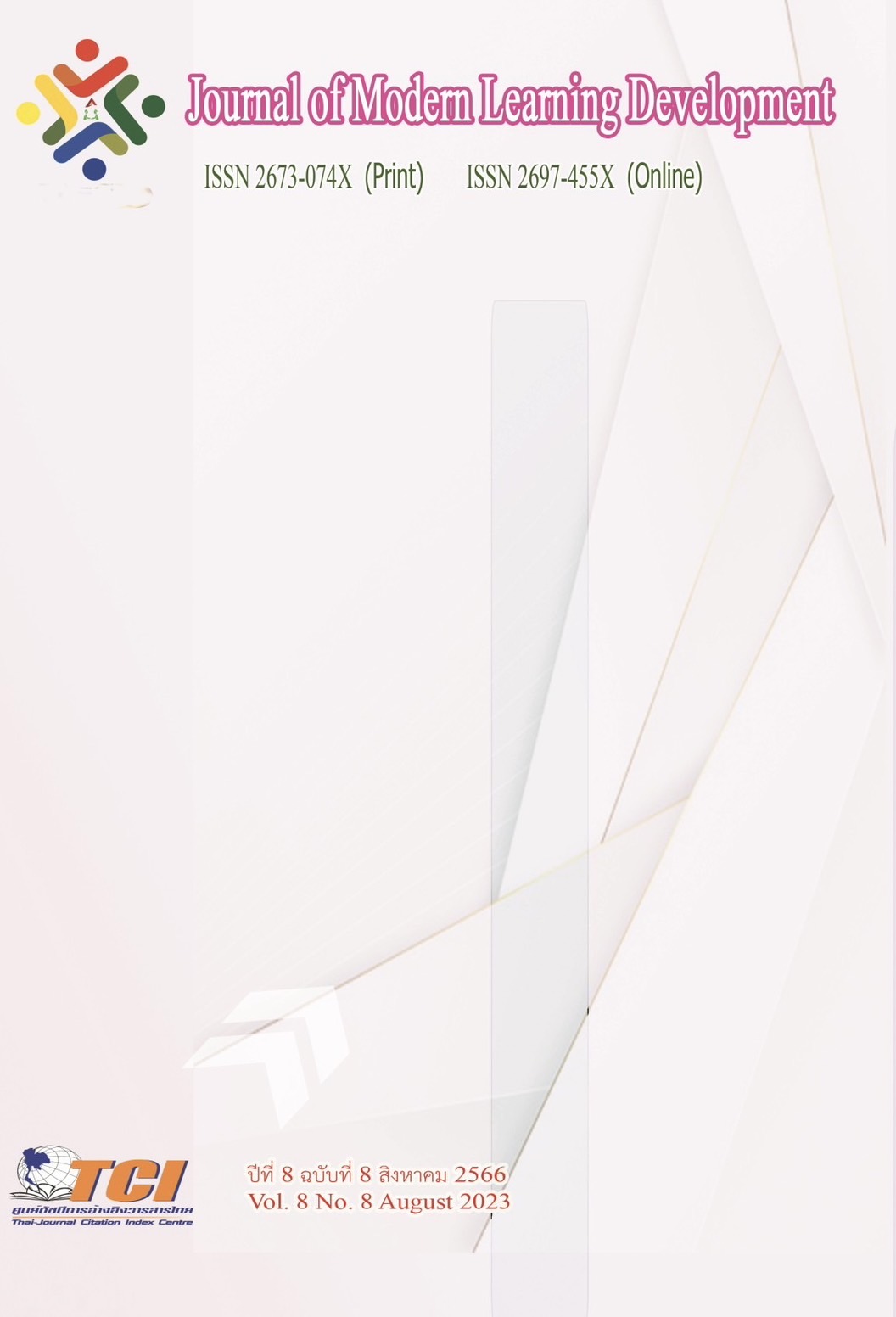การพัฒนาตัวแบบความสัมพันธ์เชิงสาเหตุของปัจจัยที่ส่งผลต่อประสิทธิผล การบริหารงานโรงเรียนคุณธรรม สังกัดองค์กรปกครองส่วนท้องถิ่น
Main Article Content
บทคัดย่อ
การวิจัยนี้มีวัตถุประสงค์เพื่อ 1) ศึกษาคุณลักษณะด้านคุณธรรมของผู้บริหารสถานศึกษา สภาพแวดล้อม
ในโรงเรียนและการจัดการเรียนการสอนของครูที่ส่งผลต่อประสิทธิผลการบริหารงานโรงเรียนคุณธรรม สังกัดองค์กรปกครองส่วนท้องถิ่น 2) พัฒนาตัวแบบความสัมพันธ์เชิงสาเหตุของปัจจัยที่ส่งผลต่อประสิทธิผลการบริหารงานโรงเรียนคุณธรรม สังกัดองค์กรปกครองส่วนท้องถิ่น และ3) นำเสนอแนวทางการพัฒนาประสิทธิผลการบริหารงานโรงเรียนคุณธรรม สังกัดองค์กรปกครองส่วนท้องถิ่น เป็นการวิจัยแบบผสานวิธี เลือกตัวอย่างแบบเจาะจงเพื่อให้ได้ข้อมูลจาก 1) ผู้บริหารสถานศึกษา 2) ครู และ3) บุคลากรทางการศึกษา โรงเรียนที่ได้รับรางวัลชนะเลิศ รองชนะเลิศอันดับที่ 1 - 3 รางวัลชมเชย และโรงเรียนที่ได้รับเกียรติบัตรเข้าร่วมโครงการ เครื่องมือที่ใช้คือ แบบสอบถามและแบบสัมภาษณ์ ทำการวิเคราะห์โดยใช้โมเดลสมการโครงสร้าง และการวิเคราะห์เนื้อหา
ผลการวิจัยพบว่า 1) คุณลักษณะด้านคุณธรรมของผู้บริหารสถานศึกษา สภาพแวดล้อมในโรงเรียนและการจัดการเรียนการสอนของครูที่ส่งผลต่อประสิทธิผลการบริหารงานโรงเรียนคุณธรรม สังกัดองค์กรปกครองส่วนท้องถิ่น โดยรวมอยู่ในระดับมาก 2) ตัวแบบความสัมพันธ์เชิงสาเหตุของปัจจัยที่ส่งผลต่อประสิทธิผลการบริหารงานโรงเรียนคุณธรรม สังกัดองค์กรปกครองส่วนท้องถิ่น พบว่า โมเดลการวิเคราะห์ปัจจัยที่มีอิทธิพลต่อประสิทธิผลการบริหารงานโรงเรียนคุณธรรมสังกัดองค์กรปกครองส่วนท้องถิ่นมีความเหมาะสม กลมกลืนกับข้อมูลเชิงประจักษ์ อย่างมีนัยสำคัญทางสถิติที่ระดับ .01 และ3) แนวทางการพัฒนาประสิทธิผลการบริหารงานโรงเรียนคุณธรรม สังกัดองค์กรปกครองส่วนท้องถิ่น ประกอบด้วย 6 กลยุทธ์คือ กลยุทธ์การจัดสภาพแวดล้อมและระบบนิเวศในโรงเรียน กลยุทธ์การสร้างปัจจัยเอื้อและการบริหารจัดการของผู้บริหาร กลยุทธ์การส่งเสริมพฤติกรรมของบุคลากรต้นแบบ กลยุทธ์การเสริมพลังจัดการเรียนรู้ กลยุทธ์การเสริมสร้างนักเรียนให้มีคุณธรรมและจริยธรรมในยุคดิจิทัล และกลยุทธ์การสร้างเครือข่ายภายนอกและการมีส่วนร่วมของชุมชนและผู้ปกครองนักเรียน โดยมีเงื่อนไขความสำเร็จในการนำกลยุทธ์ไปสู่การปฏิบัติ ประกอบด้วยการเสริมพลังใน 3 บทบาทคือ บทบาทของผู้บริหาร บทบาทของครู และบทบาทของชุมชนและครอบครัว ซึ่งจะต้องสนับสนุนซึ่งกันและกันและเป็นปัจจัยเอื้อต่อกัน
Article Details
เอกสารอ้างอิง
กรมวิชาการ. (2551). หลักสูตรแกนกลางการศึกษาขั้นพื้นฐาน พุทธศักราช 2551. กรุงเทพมหานคร: กรมวิชาการ กระทรวงศึกษาธิการ.
แก้วมณี โสพิน และ จรัส อติวิทยาภรณ์. (2563). คุณลักษณะผู้บริหารสถานศึกษาที่พึงประสงค์ของข้าราชการครู ในเครือข่ายพันธปัญญา สังกัดสำนักงานเขตพื้นที่การศึกษาประถมศึกษา พัทลุง เขต 2. การประชุมหาดใหญ่วิชาการระดับชาติและนานาชาติ ครั้งที่ 11 (หน้า 1306 - 1317). สงขลา: มหาวิทยาลัยหาดใหญ่.
จิโรจ จิ๋วแหยม และคณะ. (2565). การพัฒนาโมเดลสมการโครงสร้างพหุระดับจริยธรรมเชิงพุทธของผู้บริหารสถานศึกษาที่ส่งผลต่อจิตลักษณะและพฤติกรรมการทำงานอย่างมีจริยธรรมเชิงพุทธของครูในโรงเรียนวิถีพุทธ สังกัดสำนักงานคณะกรรมการการศึกษาขั้นพื้นฐาน. วารสาร มจร พุทธปัญญาปริทรรศน์. 7 (2) , 167 - 181.
ชาญชิต ทัพหมี. (2564). รูปแบบการพัฒนาการบริหารโรงเรียนคุณธรรม สังกัดสำนักงานเขตพื้นที่การศึกษาประถมศึกษาในเขตภาคเหนือ. วิทยานิพนธ์หลักสูตรการศึกษาดุษฎีบัณฑิต สาขาวิชาการบริหารการศึกษา. บัณฑิตวิทยาลัย: มหาวิทยาลัยนเรศวร.
ทวีศักดิ์ แก้วอาษา และคณะ. (2564). คุณลักษณะที่พึงประสงค์ของผู้บริหารสถานศึกษา สังกัดสำนักงานเขตพื้นที่การศึกษาประถมศึกษาอบุลราชธานี เขต 4. การประชุมวิชาการระดับชาติ ครั้งที่ 8 ประจำปี พ.ศ. 2564 (หน้า 465 - 473). นครราชสีมา: วิทยาลัยนครราชสีมา
ธานินทร์ กรัยวิเชียร. (2547). คุณธรรมและจริยธรรมของผู้บริหาร. กรุงเทพมหานคร: สำนักงานคณะกรรมการข้าราชการพลเรือน.
ธานินทร์ กรัยวิเชียร. (2550). คุณธรรมและจริยธรรมของนักกฎหมาย. กรุงเทพมหานคร: สำนักงานอบรมศึกษากฎหมายแห่งเนติบัณฑิตยสภา.
ธีระ ขันบุตร. (2562). กลยุทธ์การบริหารจัดการโรงเรียนคุณธรรมที่มีสัมฤทธิผล โรงเรียนบ้านปากน้ำ (เผดิมจีนนาวาสงเคราะห์) อำเภอเมือง จังหวัดชุมพร. วารสารการบริหารการศึกษา มหาวิทยาลัยศิลปากร. 10 (1), 955 - 966.
พิริยะ ผลพิรุฬห์. (2552). การวางแผนกลยุทธ์และการวิเคราะห์โครงการ. กรุงเทพมหานคร: ไทยพัฒนรายวันการพิมพ์.
พวงรัตน์ ทวีรัตน์. (2543). วิจัยทางพฤติกรรมศาสตร์และสังคมศาสตร์. (พิมพ์ครั้งที่ 8). กรุงเทพมหานคร: สำนักพิมพ์จุฬาลงกรณ์มหาวิทยาลัย.
วิภาพรรณ เนตรอนงค์ และ ทองสุข วันแสน. (2562). บทบาทผู้บริหารในการส่งเสริมการจัดการเรียนรู้ที่เน้นคุณธรรมจริยธรรมในโรงเรียนกลุ่มศรีรัตนะ สังกัดสำนักงานเขตพื้นที่การศึกษาประถมศึกษาศรีสะเกษ เขต 4. วารสารการบริหารและนวัตกรรมการศึกษา. 2 (2), 50 - 70.
วิไล หนูนาค และ ศิริชัย ชินะตังกูร. (2556). ปัจจัยที่มีผลต่อคุณลักษณะอันพึงประสงค์ด้านคุณธรรมของนักเรียนในโรงเรียนมัธยมศึกษาเขตภาคใต้ฝั่งอันดามัน. วารสารวิชาการมหาวิทยาลัยราชภัฏภูเก็ต. 9 (2), 89 - 113.
ศูนย์โรงเรียนคุณธรรม มูลนิธิยุวสถิรคุณ. (2560). กระบวนการพัฒนาโรงเรียนคุณธรรมทำอย่างไรให้ประสบความสำเร็จ. กรุงเทพมหานคร: สหมิตรพริ้นติ้งแอนด์พับลิสซิ่ง.
สายันต์ โพธิ์ทอง. (2563). อัตลักษณ์โรงเรียนคุณธรรม. วิทยานิพนธ์หลักสูตรปรัชญาดุษฎีบัณฑิต สาขาวิชาการบริหารการศึกษา. บัณฑิตวิทยาลัย: มหาวิทยาลัยศิลปากร.
สิรินภา จงทำมา. (2560). บทบาทของผู้บริหารสถานศึกษาในการส่งเสริมกระบวนการจัดการเรียนรู้ที่เน้นผู้เรียนเป็นสำคัญของโรงเรียนเอกชนในกำกับของสำนักงานเขตพื้นที่การประถมศึกษาอุตรดิตถ์ เขต 1. วิทยานิพนธ์ปริญญามหาบัณฑิต. บัณฑิตวิทยาลัย: มหาวิทยาลัยมหามกุฏราชวิทยาลัย.
อุดมลีลา และคณะ. (2561). กลยุทธ์การพัฒนาจริยธรรมนักเรียนในสถานศึกษาขั้นพื้นฐานสังกัดสำนักงานเขตพื้นที่การศึกษาประถมศึกษากำแพงเพชร เขต 1 และ 2. วารสารวิชาการศึกษาศาสตร์. 19 (2), 197 - 213
Hubbard, R., & Power, B. (1999). Living the questions: A guide for teacher-researchers. York, ME: Stenhouse.


